Country of origin: Denmark
Age group: 23-25
Reason for going abroad: Volunteer & work
Travel destination: Mozambique, Africa
Grant: Spring 2016
Dear friends,
My name is Lisbeth, I’m a 24-year-old Danish marine biologist currently living out my dream in Praia do Tofo in Mozambique to become a shark researcher :) Now after 7 months since I arrived in this wonderful country...my dream has come true.
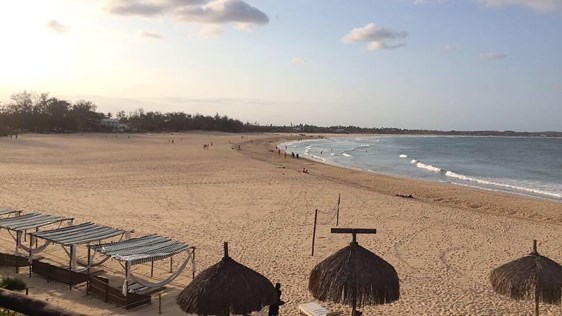
Above: With an office view like this, I don't mind spending time in the office
Below: Casa Tofinho, where I lived the first two months. There is just something about having your own private passion fruit tree in the front yard and a view of the bay from your terrace.
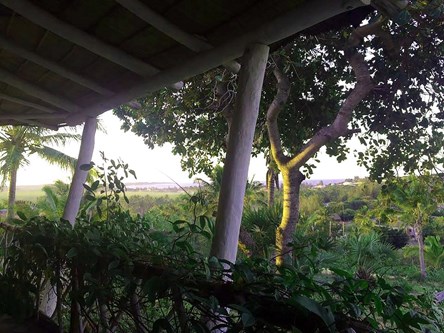

Below: Sunset at Tofinho Beach
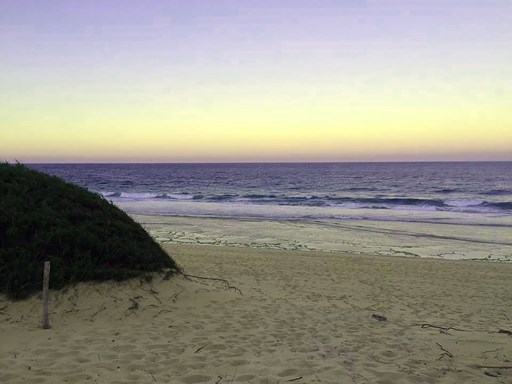
Below: Sunday pancake brunch with the other MMF volunteers at Casa Tofinho
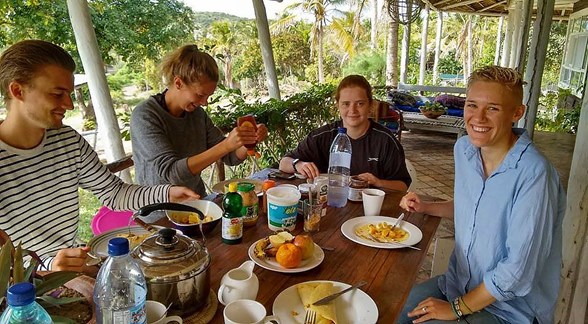
I'd like to take you back to the start....of the time when I arrived: I caught a serious case of what my friend calls ‘Africa fever’ in January 2015 when I visited for the first time. I was volunteering as a research intern with Oceans Research in Mossel Bay, South Africa, to test out a long-term dream I had – becoming a shark researcher.
I got completely hooked, not just on Africa, but also to the life of my new profession. 10 months later, in November 2015, I graduated my MSc in Applied Wildlife Conservation. So there I was, with brand-new, shiny and completely unused masters degree and a burning desire to become a shark researcher.
Research jobs don’t grow on trees, and shark research jobs even less so. So I decided to take a year out of my life to do volunteer work in Africa to gain the experience I needed to apply for a PhD and continue my dream...and this is why I'm in Mozambique.
I have chosen to call this news post “Our Ocean. Our Future“ because I believe the Ocean is my future...because I am lucky enough to have chosen it myself.
My Mozambican friends don’t have that choice – their future depends on the Ocean, whether they like it or not.
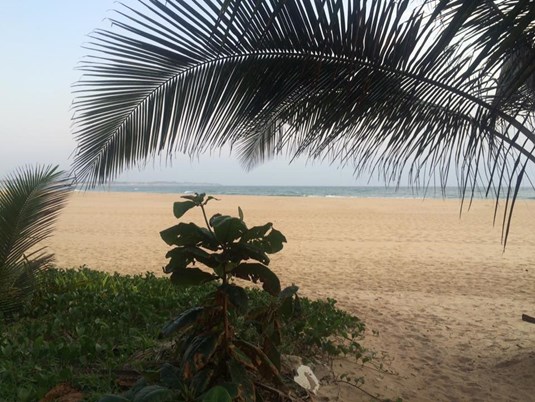
Above: The Ocean is the source of food and income for the majority of the population. 45% of the population work in or on the water
Mozambique is sadly the world’s 7th poorest country.
The majority of the population lives near the coast and depend almost entirely on the ocean for a source of income and food.
Currently, overfishing, unsustainable fishing practices and targeted fisheries of rays and sharks is causing declining fish stocks, pushing species towards extinction and threatening the livelihood of both present and future generations of Mozambicans.
So where is the hope for the future? - The hope lies in sustainable fishing and ecotourism!
Mozambique is lucky enough to be home to iconic marine life such as manta rays and whale sharks. People travel to Mozambique from all over the world to dive with manta rays or snorkel with whale sharks...making ecotourism a million dollar business for Mozambique and with the potential of generating new jobs to replace those that may no longer exist within fishing.
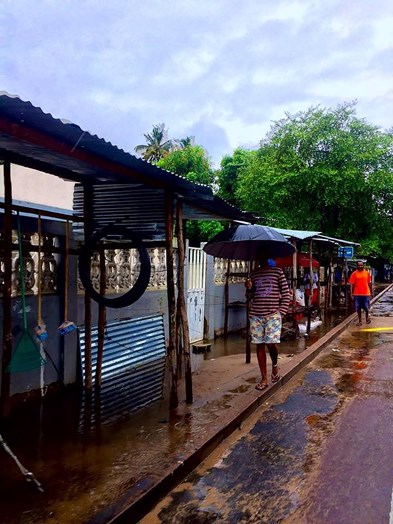
Above: The streets of Inhambane, what the nearest ‘big’ town looks like during the rainy season
...In July 2016 I moved to Praia do Tofo to work for Marine Megafauna Foundation (MMF, www.marinemegafauna.org), an international NGO that aims to save threatened marine life through research, education, and conservation.
For the first two months of my stay, I had the privilege of managing MMF’s flagship conservation project, the Sustainable Seas Project, which works to promote sustainable fishing practices in the Inhambane province through education and community engagement.
Together with MMF’s Education and Conservation Field Officers, I worked with local fishermen and communities in the area towards setting up a no-take zone (a zone where all fishing activities are suspended) in Tofo Bay for a 6-month test phase.
Working with my local colleagues, the fishermen and communities has been very interesting, rewarding, humbling and, at times, incredibly frustrating. However, it has taught me a lot about communication, respect and has made me completely redefine many of my values :)
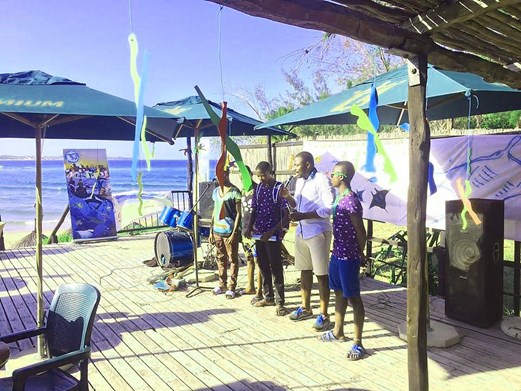
Although most of the population in Mozambique live near the coast, only very few people know how to swim.
Marine Megafauna Foundation has created Nemos Pequenos, an ocean guardian programme for school kids in the Inhambane Province. The programme gives the kids the opportunity to learn how to swim and teaches them about the amazing marine life in their province and how to protect it. The above picture is from the celebration of Nemos Pequenos’ 5th year anniversary in January 2017.
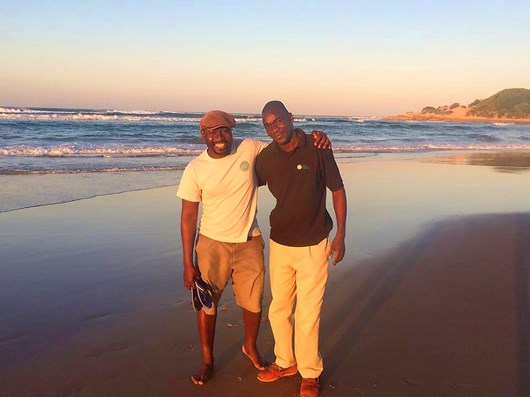
Above: Gabriel and Herculano, the Education and Conservation Field Officers at MMF, and my two closest colleagues when I managed Marine Megafauna Foundation’s conservation projects
In September 2016 I took a break from the conservation work to do my PADI Divemaster training with Peri-Peri Divers in Tofo. Water is my element, so I was thrilled to spend 3 months in a wetsuit during my internship with the dive centre.
I finished my training in December and have been working freelance with Peri-Peri since then. I feel incredibly privileged to be allowed to have wonderful interactions with marine life and teach tourists and volunteers about marine biology, conservation, and sustainability.
Deciding to do my divemaster training was one of the best things I have ever done! Not only has it given me unforgettable underwater adventures, it has also given me a second family here in Mozambique! My instructors, divemaster colleagues and co-trainees are like family to me now and I am so happy that I got to spend my birthday, Christmas and New Year with them.
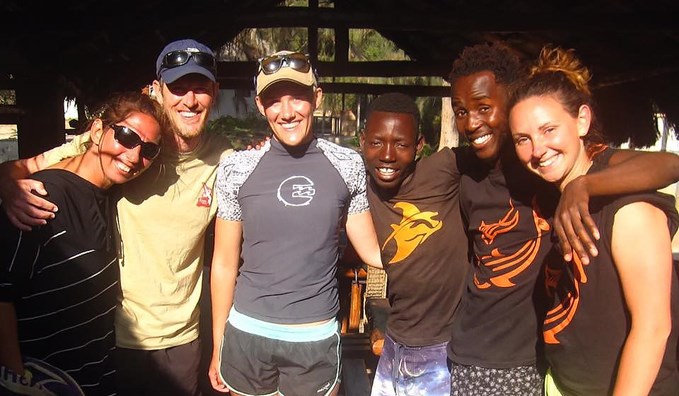
Above, from the left to right: Maria and Will, two of the Underwater Africa volunteers I got to know during my divemaster training, me, Jerry (divemaster and co-trainee), Moisès (dive instructor) and Jenny (co-trainee)
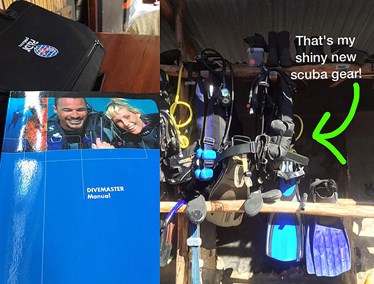
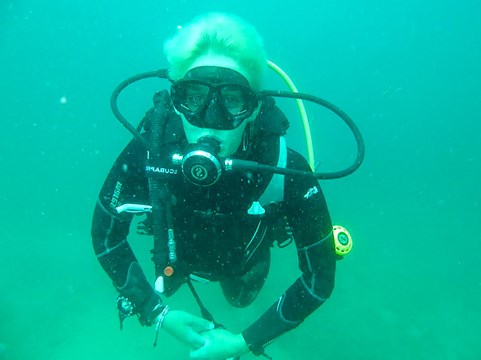
Below: Moisès and me at Peri-Peri. Moisès is one of the absolute coolest people I know and if it wasn’t for him I would never have been able to complete my divemaster training!
Not only is he an amazing friend that I can always rely on, he is also one of the most ambitious, hardworking and intelligent people I have ever met.
Moisès can do anything he sets his mind to – and he already has. He has taught himself how to swim and how to speak English. He decided to become a diver - and at the age of 21 Moisès has become one of the first Mozambican PADI Open Water Instructors ever!
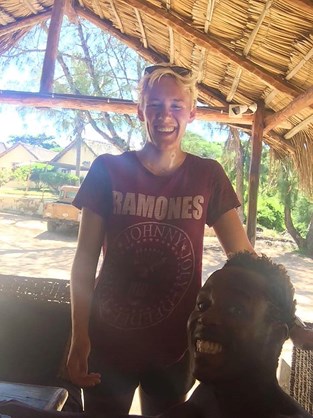
After 4 months as a dive professional, I’m now back doing conservation work. In January 2017 I started a new exciting job with MMF as a Whale Shark Research Assistant.
Over the next couple of months, I will be helping MMF work to protect and conserve marine megafauna in Mozambique. Daily, I go on Ocean Safaris (open ocean snorkel trips with whale sharks, dolphins, manta rays and turtles) to collect sightings data and identification photos of whale sharks.
My work consists of contributing to the international whale shark sightings database www.whaleshark.org that helps researchers across the globe identify, count and track whale sharks.
A very important part of my work is also to educate the public! So, on my Ocean Safaris with Peri-Peri I talk with the tourists and volunteers about whale sharks, marine conservation and how they can get involved...and once a week I give a talk about whale sharks at the lodge where our research centre is based.
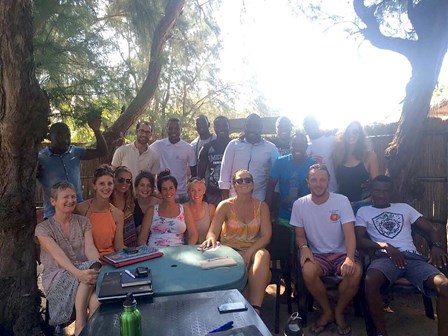
Above: the Marine Megafauna Foundation team at the Manta Ray and Whale Shark Research Center in Tofo
Below: On some days I am lucky enough that my office looks like this. The water is, as my friend puts it, ‘my happy place’ and snorkeling with whale sharks definitely doesn’t make it any less happy
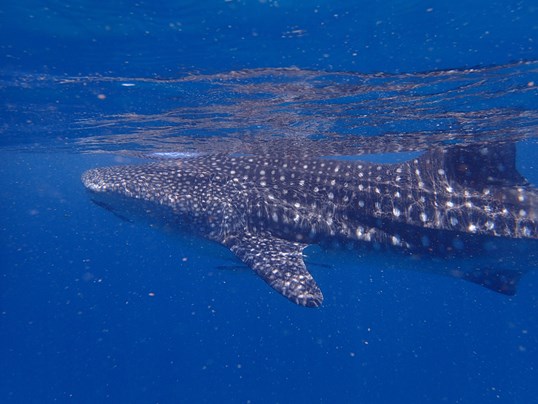
To get an idea of what my life here in Tofo looks like check out the cool CNN video below about my friends and colleagues at MMF and Peri-Peri and the Sustainable Seas Project that I was working on:
...and stayed tuned to hear more about marine conservation and whale sharks!
Tchau, até logo! (Bye, see you soon!)
~ Lisbeth